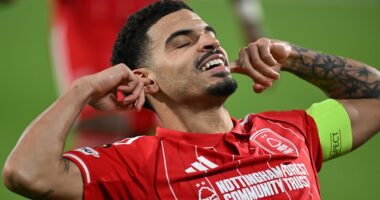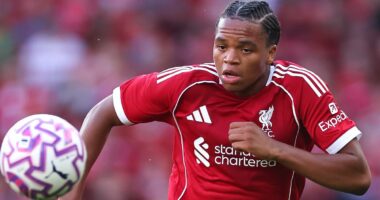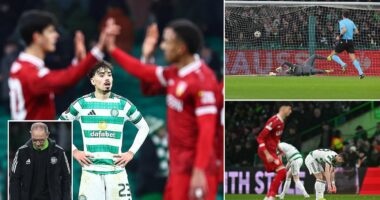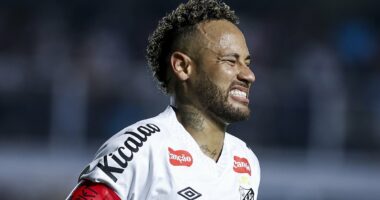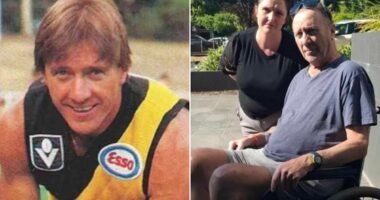Share this @internewscast.com
In the world of high-stakes sports, the priority is always the bottom line. When an investment seems at risk or doesn’t yield the expected returns, action is inevitable.
Consider the case of Arne Slot. Observers may question why Fenway Sports Group (FSG), the owners of Liverpool, haven’t already taken decisive steps. Despite facing a ninth defeat in just 12 games, Slot, with a weary expression, acknowledged the speculation about his future but maintained that he currently feels secure in his position.
This sentiment aligns with Liverpool’s official stance. Even after rumors linked the club with German head coach Julian Nagelsmann, Liverpool stated on Tuesday that they have no plans to replace Slot. The speculation caught them by surprise, and two days later, their position remained unchanged, despite a crushing defeat by PSV Eindhoven.
Does this scenario sound familiar?
Consider Alex Cora, who led the Boston Red Sox, another FSG-owned team, to a championship in 2018. Despite challenges, he guided the team to the playoffs with an 89-73 record and is set to manage them through 2026, as his contract extends to 2027.

Many will look at Arne Slot’s situation and wonder why Fenway Sports Group, Liverpool ’s owners, haven’t pressed the button already

Slot conceded with haunted eyes, after defeat number nine in 12 games, that it is normal to talk about his long-term prospects

FSG kept the faith with Alex Cora, the Boston Red Sox head coach who won the 2018 World Series, when things looked bleak in May this year
When FSG has confidence in a coach, they show unwavering support. Take Jurgen Klopp, for example. He joined Liverpool in October 2015 and quickly gained their trust, securing a contract extension just months later. Similarly, Slot engaged in discussions with FSG last season about lengthening his tenure.
So, if they can, FSG will provide a foundation for their figurehead to thrive. Should things go wrong, however, they will move quickly and decisively. A decade of stability at Liverpool shouldn’t make you forget the ruthlessness they had previously shown to change the landscape.
Remember Damien Comolli? He was appointed in November 2010, not long after FSG (then called New England Sports Ventures) had become Liverpool’s new owners; the Frenchman became the club’s first sporting director and was viewed as the ideal man to implement their ‘Moneyball’ approach to the transfer market.
‘Damien not only has a strong work ethic, but he is highly ethical in his dealings,’ John W Henry told Daily Mail Sport in November 2011. ‘That can be a disadvantage from time-to-time, but over the long term it is what Liverpool Football Club deserves – what the fans of this club deserve.
‘He represents us extremely well – not just in transfer work, but in a number of the most important aspects of the operation. I believe not having a director of football is a gamble and Kenny (Dalglish) agrees with that perception.’
The words were glowing but six months later Comolli was gone. He’d sanctioned several signings – including Andy Carroll, Luis Suarez, Stewart Downing and Jordan Henderson – in a 12-month period, at a cost of £150million. Too many failed to pay off and he carried the can, sacked before an FA Cup semi-final against Everton.
Liverpool won the League Cup that year and reached the FA Cup final, losing to Chelsea. Yet they had finished miles behind in the race for a Champions League spot and without the finances that brought – something that was critical to the model – there were going to be consequences.
Dalglish, Anfield’s greatest figure, was relieved of his duties when the season ended. It was, for many of a certain age, an incredibly cold decision. Were they placing money ahead of silverware? Dalglish had secured Liverpool’s first trophy for six years but Henry was adamant that change had to be made.

Damien Comolli was sacked in April 2012 after several of his signings failed to work out

Liverpool legend Kenny Dalglish was shown the door by FSG chiefs Tom Werner (left) and John W Henry (right) in 2012 despite winning the club’s first trophy for six years
‘The FA Cup would not have made any difference had he won it, no, no,’ Henry explained from a private box at Boston’s Fenway Park in July 2012. ‘We were 17th (in the form table) over the second half of the season and Liverpool should not be in that position.
‘I don’t place the blame on Kenny and Steve (Clarke, assistant coach) – but I think it was obvious to every Liverpool fan that something was wrong and something needed to be done in the current circumstances. The play was lacking, so that entered into our considerations.’
Funny how the more things change, the more they stay the same. Everything Henry said in 2012 chimes now about where Liverpool are in the form table – they have only won six of their last 16 Premier League fixtures – and how performances don’t marry up to the squad’s potential.
Slot, publicly, might say he feels safe but, privately, he will know the pressure he is under. And it absolutely should not be overlooked that Richard Hughes, the club’s current sporting director, must also be in the spotlight, given his role in the £450million summer spend.
FSG are made of serious people who expect a return for their stakes. When Liverpool floated the idea of moving away from Melwood, their historic training base, in the summer of 2019, there was uproar in West Derby, given how synonymous the facility was with the club.
Locals protested and an action group was formed but none of this perturbed men such as Mike Gordon, the influential president of FSG, who saw a deal that could be done and that the money that was to come in from a property developer would go straight to paying off the new training base in Kirkby.
That same summer Liverpool had gone to the United States for a pre-season tour and played a game against Borussia Dortmund at Notre Dame Stadium, with its 77,622 capacity; the newly crowned Champions League winners, however, didn’t prove to be a draw and the stadium was sparsely populated.
A couple of days before the fixture in South Bend, Indiana, Liverpool’s commercial director Olly Dale suddenly left his post. It was dressed up as a mutual decision but those with knowledge of the situation would have a different take.

(Left to right) Liverpool CEO Billy Hogan, sporting director Richard Hughes, Slot, Linda Pizzuti Henry, John W Henry and FSG president Gordon

Liverpool chairman Werner (left, with Gordon and Henry) was at Anfield last Saturday and saw the embarrassment against Nottingham Forest for himself
FSG turned Liverpool into one of the best-run football clubs in the business, respected around the world, but they did it by not shirking away when big calls had to be made. They are custodians of the club but they aren’t people who will be swayed by sentimentality.
Tom Werner, Liverpool’s chairman, was at Anfield last Saturday and saw the embarrassment against Nottingham Forest for himself. They want Slot – deliverer of that unexpected 20th title – to turn this around, they want to show faith similar to Cora in Boston. But patience is not limitless.
If Liverpool’s chances of qualifying for next season’s Champions League are in jeopardy, if Alexander Isak and Florian Wirtz don’t deliver to the tune of their £241million transfer expenditure, there will be consequences.
Don’t say you haven’t been warned.


